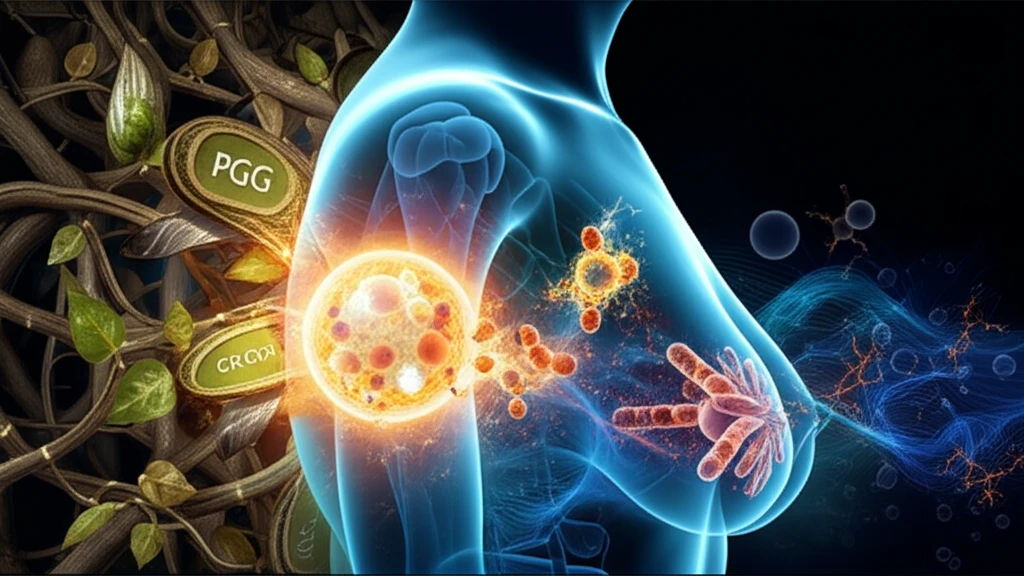
Tridham and PGG: Nature's Answer to Breast Cancer?
"Unlock the potential of ancient herbal remedies to combat breast cancer: Can Tridham and Pentagalloyl glucose (PGG) reverse oxidative stress and restore mitochondrial health?"
Breast cancer remains a significant global health concern, driving continuous research for more effective and less harmful treatments. While conventional therapies play a crucial role, the exploration of natural compounds offers promising avenues for innovative approaches. This article delves into the potential of two such natural agents, Tridham and Pentagalloyl glucose (PGG), in combating breast cancer.
Mitochondria, the powerhouses of our cells, play a pivotal role in cellular health and disease. In cancer, mitochondrial dysfunction and increased production of reactive oxygen species (ROS) contribute to tumor growth and metastasis. Restoring mitochondrial balance and reducing oxidative stress have emerged as key strategies in cancer therapy. Researchers are actively exploring ways to deliver targeted antioxidants directly to mitochondria.
This article examines the findings of a study investigating the effects of Tridham, a Siddha formulation, and PGG, a naturally occurring antioxidant, on breast cancer in rats. We'll explore how these compounds can reverse lipid peroxidation, enhance mitochondrial antioxidant status, and potentially inhibit cancer cell growth.
Can Ancient Remedies Combat Cancer by Targeting Mitochondria?

The study, conducted on Sprague-Dawley rats, investigated the impact of Tridham (TD) and Pentagalloyl glucose (PGG) on mammary carcinoma induced by DMBA, a potent carcinogen. Rats were divided into groups receiving DMBA alone, DMBA plus Tridham, DMBA plus PGG, DMBA plus Cyclophosphamide (a standard chemotherapy drug), or Tridham/PGG alone. The researchers then assessed lipid peroxidation levels and mitochondrial antioxidant status in the mammary glands of these rats.
- Tridham: A Siddha formulation composed of Terminalia chebula, Elaeocarpus ganitrus, and Prosopis cineraria, known for its antioxidant and anticancer properties.
- Pentagalloyl Glucose (PGG): A naturally occurring antioxidant found in various plants, including Terminalia chebula, with demonstrated anticancer potential.
- Lipid Peroxidation (LPO): A process in which free radicals damage lipids, leading to cellular dysfunction and disease.
- Mitochondrial Antioxidants: Enzymes and molecules that protect mitochondria from oxidative damage, essential for maintaining cellular energy production and overall health.
A Promising Future for Natural Cancer Therapies?
The study's results underscore the potential of natural compounds like Tridham and PGG in breast cancer therapy. Their ability to target mitochondrial dysfunction and reduce oxidative stress offers a complementary approach to conventional treatments. Unlike some conventional therapies that can have harsh side effects, Tridham and PGG showed no significant adverse effects in the study, suggesting a potentially safer alternative or adjunct therapy.
While these findings are promising, it's important to recognize that this research was conducted on rats. Further studies, including clinical trials in humans, are necessary to confirm the efficacy and safety of Tridham and PGG in breast cancer treatment. However, this research paves the way for exploring natural therapies that harness the power of antioxidants and mitochondrial support.
The exploration of Tridham and PGG highlights the increasing interest in integrative approaches to cancer treatment, combining conventional medicine with natural therapies to enhance outcomes and improve the quality of life for patients. As research continues, these natural compounds may offer new hope in the fight against breast cancer.
